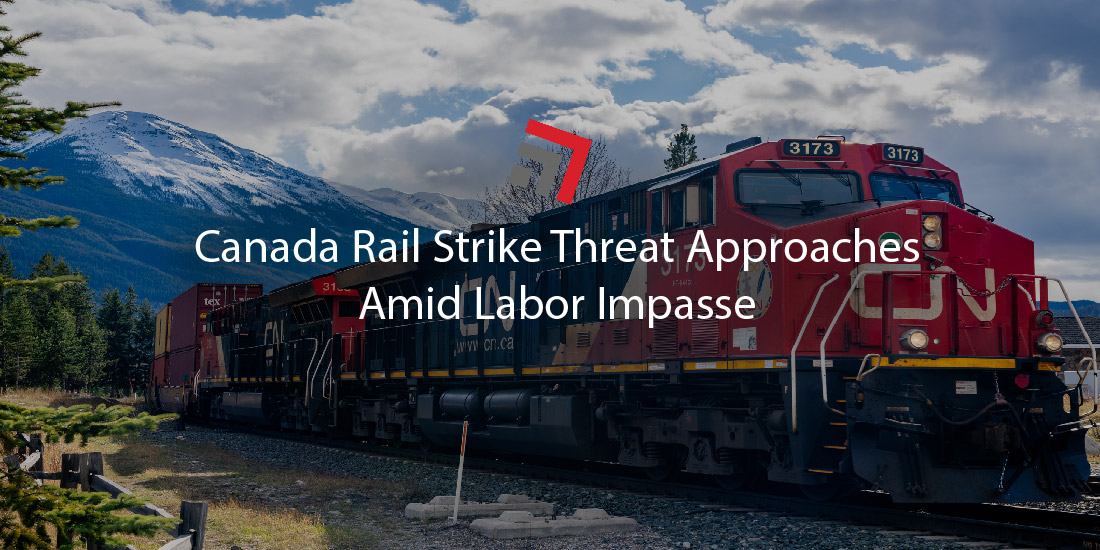Teamsters Canada Rail Conference (TCRC), the trade union representing rail workers employed by Canada’s two Class I railroads, is warning that a labor strike could now occur after contract negotiations have halted over issues of working conditions and wage increases.
The union is currently negotiating with Canadian National (CN) and Canadian Pacific Kansas City (CPKC) to renew three collective agreements that cover nearly 9,300 employees of the railroads.
It appears discussions have taken a turn for the worst as Teamsters publicly denounced the railroads for not taking the negotiations seriously. The union claims that the alleged flippancy is essentially inviting a work stoppage.
“Canadian railroads [CN and CPKC] don’t care about supply chains, farmers, or small businesses. They care about their bottom line, and squeezing everything they can out of their employees. If they need to manufacture a work stoppage to get there, they won’t think twice,” TCRC President Paul Boucher stated in a news release posted on Teamster Canada’s website last week.
François Laporte, national president of Teamsters Canada, further added: “CN and CPKC aim to eliminate all safety-critical rest provisions from our collective agreements. These provisions are necessary to combat crew fatigue and ensure public safety. We want to reach a negotiated settlement, but their demands are non-starters for the Teamsters.”
TCRC asserts that their rail worker members are on-call workers with erratic schedules, making it difficult to rest between shifts and not return to work fatigued. As the current collective agreements stand, rest provisions are included which allow workers to better manage their fatigue.
The existing collective agreements between TCRC workers and CN and CPKC expired Dec. 31. However, under Canadian law, these agreements remain in effect until the two parties reach new terms.
Of the near 9,300 workers apart of the union’s rank-and-file, 6,000 of them are conductors, yard coordinators, and train engineers across CN’s Canadian network, while 3,200 engineers, conductors, and yard coordinators are employed by CPKC.
On Feb. 16, prior to union’s statements above, CN and CPKC alerted stakeholders that they respectively filed notices of dispute with Canada’s labor minister, seeking the appointment of a federal broker to assist in further negotiations with the union.
The railroads’ decision to file their grievances is why TCRC suggests they are inviting labor-related actions in the future. Since CN and CPKC filed these notices, a legal process towards a possible strike or lockout is underway. Under Canadian law, a work stoppage may occur as soon as 81 days after government mediators are assigned to the negotiations. In this case, such a dispute could start in May.
Railroads blame impasse on union
In response to TCRC’s claims, the railroads have been on the counteroffensive.
In an email to FreightWaves, a CPKC representative wrote: “It is unfortunate that once again the TCRC–Train & Engine (T&E) division has chosen to grossly misrepresent the facts regarding our ongoing collective bargaining and the multiple proposals made by CPKC. The TCRC running trades leadership has again distorted the truth in an attempt to create a false narrative.”
CPKC asserts the railroad has offered wage increase, quality-of-life improvements, and predictable schedules (including assigned days off), but admits that it remains far apart on these issues with the union.
CN, Canada’s other Class I titan, argued that a changing regulatory space, including adaptions to worker rest provisions, has necessitated a modernization of their employee compensation model.
In an email also sent to FreightWaves, a CN representative wrote: “The union wants increases without the modernization of the compensation model that would support those increases.”
The representative went to add that the railroad’s employees would work a 40-hour weekly schedule, with at least ten to 12 hours of rest between shifts, while also granting two or three consecutive days off (like the weekend is for most job sectors) every work week. According to CN, this arrangement would satisfy Canada’s federal labor laws. CN says TCRC rejected the offer.
Final Thoughts
In recent years, TCRC has engaged in strike actions across both railroads’ networks.
In 2019, unionized CN workers held a strike over issues of fatigue and rail safety. In 2022, a work stoppage impacted CPKC’s operations, hindering freight rail movement across Canada.
TCRC’s parent organization Teamsters Canada is the country’s largest transportation and supply chain union. Aside from the rail industry, the union also represents Canadian workers at large couriers UPS and Purolator, as well as many trucking companies. Teamsters Canada is affiliated with the International Brotherhood of Teamsters, which represents over 1.2 million workers in North America.
Contact one of our team members if you have any questions regarding this topic or any others in domestic logistics.
More blogs similar to this:



Recent Comments